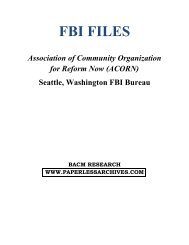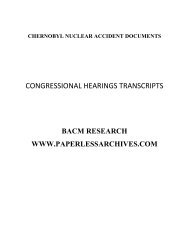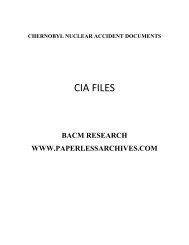national security agency journal articles world war ii german ...
national security agency journal articles world war ii german ...
national security agency journal articles world war ii german ...
You also want an ePaper? Increase the reach of your titles
YUMPU automatically turns print PDFs into web optimized ePapers that Google loves.
TOP SI!CRET GERMAN CRYPTANALYSIS W, WERTHER "TOP 5EERST<br />
the trade, .8xplanation is not enough. An explanation, for instance,<br />
of how a reciphennent is solved or how a relative code is adjusted to<br />
the presumed original does not, by any means, put him in a position<br />
to perform these tasks by himself. If he cannot himself se~ the problematic<br />
character of his work, if he does not feel the desire to force<br />
his entry into this undiscovered territory by constant questioning .a~d<br />
boring, he will never become a good cryptanalyst. Those who faJl 10<br />
the profession are prone to otTer the excuse that this or that was not<br />
shown them or not explained to them. It will almost always be true<br />
that they did not have the necessary acumen to work out the corresponding<br />
proble'm themselves. As a matter of principle everything is<br />
explained, but it must also be understood. Naturally, however, young<br />
members of the organization are not mere mental messenger boys,<br />
whose time is to be filled out exclusively with sorting messages and<br />
making counts the significance of which' may perhaps not be explained<br />
to them. At the beginning of a long and tedious training it is necessary<br />
that the novice be able to share in the exciting, nay, dramatic<br />
incidents of this work,-that one try to show him the breaking of a<br />
system or the development of a process. Great importance also attaches<br />
to having the young analyst learn to make practical and efficient<br />
use of the manifold aids afforded by all the other sections, for<br />
the best analyst is not the one who works depending upon himself<br />
alone and starting from scratch, but the one who can piece together,<br />
for his own combinations and constructions, the greatest number of<br />
buildirig blocks selected frum the results of the other sections. It<br />
cannot be over-emphasized that the art consists not in working as<br />
"creatively" as pos.qible, but in incorporating as many known technical<br />
elements as pos.qible into one's work.<br />
For this reason it is absolutely essential that the cryptanalyst have<br />
tactical schooling and be acquainted with the work of the various<br />
Evaluation Sections, at least in broad outline. One can only think<br />
with horror of the many fellow workers of those first years who, in<br />
default of the most elementary knowledge of military affairs, did not<br />
hesitate in their messages to subordinate a divisional staff to a regiment<br />
and let the regiment issue orders' to the staff or to start local<br />
reconnaissance planes on a long-range fighter mission--and when<br />
their work was criticized, to assert that what they had written agreed<br />
with the source and if the text was not satisfactory, so much the<br />
worse for the text. One trait of a really good cryptanalyst is his<br />
tendency to conservatism--- the tendency to cling to methods which<br />
have at some time proven good. It is very difficult to convince one's<br />
fellow workers that the methods they have used thus far have led to<br />
the goal to be sure, but can or must be replaced by others which are<br />
better, more logical, and more exact. At such momentB, a certain spiritual<br />
inertia becom~s manifest. Introducing the use of substitution<br />
tableB, for example"or implanting the idea that it is absolutely necessary<br />
to attempt the reconstruction of the original code even though<br />
decipherment with a relative code has been successful; such reforms<br />
require much time, effort, and pedagogical persuaBion on the part of<br />
the analyst responsible.<br />
Formal courses of instruction seemed desirable, but unfortunately<br />
the want of good cryptanalytic personnel was so keenly felt that it<br />
was not possible to release a few good men from their daily tasks to<br />
set up a permanent teaching staff and institute a long,term training<br />
program. All the short tenn and--in the last analysis-improvised<br />
courses in cryptanalysis which were giYen, revealed their inadequacy<br />
and questionable value again and again_ It was really only possible<br />
to discuss the systems briefly and to show the sort of aids necessary in<br />
working them. 'Any made-up problem is after all only an isolated<br />
phenomenon and furnishes training in the use of a particular procedure<br />
rather than in flexibility of mind. That was all, and it amounted to<br />
very little. Thus the short term courses were, for the most part,<br />
merely a means of getting acquainted with the new fellow workers.<br />
The product of the courses was never a "trained" eryptanalYBt. Such<br />
a one develops, as already remarked, only in and by practical work.<br />
As to a text book: no doubt it would have been wise to put into<br />
writing the results of practical experience, fundamental ideas, and<br />
tricks of cryptanalysis in the form of a guide, and to place this in the<br />
hands of not only the novice but the advanced student as a manual<br />
for reference work. This project. was to be carried out after the end<br />
of the <strong>war</strong>.<br />
88 89 lOP 91!CRET
















